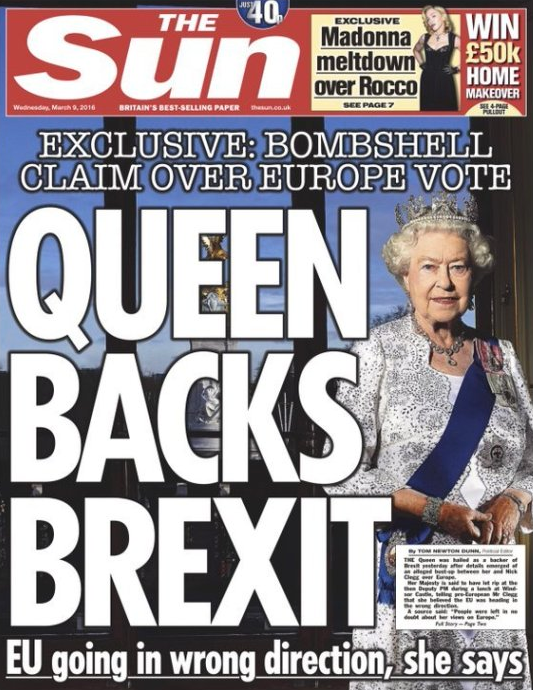EU referendum: The Sun defends 'Queen backs Brexit' headline after Ipso rules it inaccurate
Buckingham Palace complained about a story about the Queen allegedly venting her anger with Brussels to Nick Clegg

Your support helps us to tell the story
From reproductive rights to climate change to Big Tech, The Independent is on the ground when the story is developing. Whether it's investigating the financials of Elon Musk's pro-Trump PAC or producing our latest documentary, 'The A Word', which shines a light on the American women fighting for reproductive rights, we know how important it is to parse out the facts from the messaging.
At such a critical moment in US history, we need reporters on the ground. Your donation allows us to keep sending journalists to speak to both sides of the story.
The Independent is trusted by Americans across the entire political spectrum. And unlike many other quality news outlets, we choose not to lock Americans out of our reporting and analysis with paywalls. We believe quality journalism should be available to everyone, paid for by those who can afford it.
Your support makes all the difference.The Sun has published a defiant editorial declaring they “stand by all” of their coverage after the Independent Press Standards Organisation ruled the headline “Queen backs Brexit” was inaccurate.
It comes after Buckingham Palace complained about the story published on March 9 which detailed an occasion when the Queen allegedly vented her frustration with Brussels at Nick Clegg during a lunch at Windsor Castle when he was deputy prime minister.
The verdict of the Ipso ruling that found the newspaper's headline had breached Clause 1 (accuracy) of the Editors' Code of Practice was printed in an article on page two of Wednesday's edition of the newspaper.
The front-page headline read: "Queen backs Brexit" and the paper quoted a "senior source" as saying that people who heard their conversation "were left in no doubt at all about the Queen's views on European integration".
The article said two unnamed sources had claimed that the Queen made critical comments about the EU at two private functions – first with Nick Clegg at a lunch for Privy Counsellors at Windsor Castle in 2011, and at a reception for MPs at Buckingham Palace.
Today the newspaper printed an acknowledgement of the ruling on its front page, saying: “Ipso rules against Sun’s Queen headline. See page two”. But an editorial published on page ten hit out at the ruling, claiming that a “newspaper wouldn’t be a newspaper if it got wind of such views – so clearly in the public’s interest to read – and didn’t publish them”.
Tony Gallagher, the editor of the Sun, told BBC Radio 4's Today programme: "I don't accept that we made an error at all. We made a judgment that the headline was right and that it was backed up by the story."
He added: "I don't think were I doing this again tomorrow I would act in any way differently whatsoever. Given what I know about the detail of the sourcing and given what I know about the detail of the conversation, frankly, we would be better packing up and going home as journalists if we didn't actually put these things in the public domain."
The editorial added: “Does the Queen back Brexit? We’re sure she does. But today we are having to publish a front page ruling by the Press regulator Ipso over our March 9 headline which claimed Her Majesty was for Leaving.

“It seemed fair enough for us. Tabloid newspapers like The Sun have long made eye-catching assertions in headlines alongside a smaller headline to qualify or attribute them. It is a standard device.
“But Ipso decided it wasn’t right – though it had no problem with the story beneath it, about Her Majesty’s Eurosceptic remarks which two impeccable sources confirmed.
“We stand by all of it. We respect Ipso and understand why the Queen complained. She was furious at the claim she had taken sides in a political dispute. But the idea she keeps all her thoughts to herself is nonsense”.
At the time, former Liberal Democrat leader Mr Clegg dismissed the report as "nonsense", while the Palace said: "The Queen remains politically neutral, as she has for 63 years.
"We will not comment on spurious, anonymously sourced claims. The referendum is a matter for the British people to decide."
Justice Secretary Michael Gove refused to rule out being the source of the leak and The Sun said it stood by its story and planned to defend against the complaint "vigorously".
Ipso said that while the article itself did not breach the code, the headline did as it was "a factual assertion that the Queen had expressed a position in the referendum debate, and there was nothing in the headline, or the manner in which it was presented on the newspaper's front page, to suggest that this was conjecture, hyperbole, or was not to be read literally".
The article which details the ruling – ordered by Ipso as a remedy for the inaccuracy – said: "Ipso acknowledged the importance of headlines in tabloid newspapers.
"However, it did not follow from the comments the article reported that the Queen wanted the UK to leave the EU as a result of the referendum: that suggestion was conjecture and the committee noted that none of those quoted in the story were reported as making such a claim.
"The headline was not supported by the text. It was significantly misleading – given that it suggested a fundamental breach of the Queen's constitutional obligations."
Join our commenting forum
Join thought-provoking conversations, follow other Independent readers and see their replies
Comments